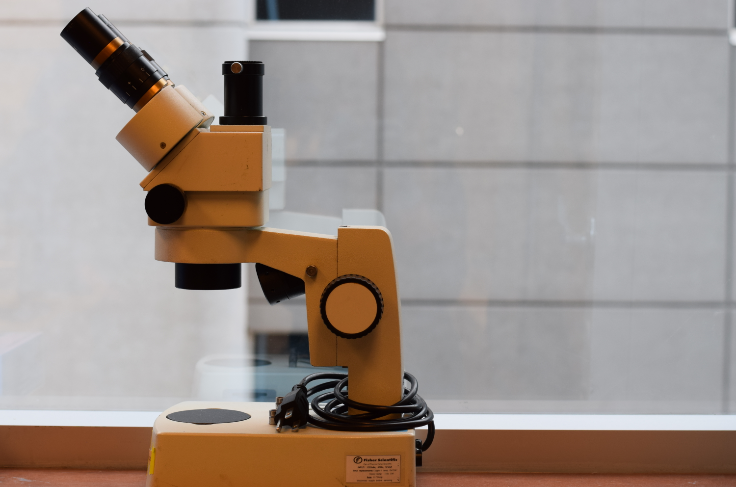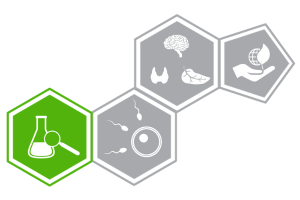
THEME 1

DETECTION, MONITORING, MODELING, AND TREATMENT
Thematic Leader: Sébastien Sauvé
The objective of this theme is to develop effective protocols for the detection of endocrine disruptors to enhance their monitoring and the ability to model their levels in the environment. Theme 1 will also focus on the discovery of improved techniques for treating liquid and solid matrices contaminated by endocrine disruptors. Research on the detection and monitoring of endocrine disruptors includes the development of new methods for extracting and purifying these contaminants, quantifying them by new analytical methods, and measuring their harmful effects by cellular or biochemical methods. The development of new geomatic and remote sensing tools that can assess the biological content or effects of large-scale endocrine disruptors is also a research area explored by our researchers. In terms of treatment, research includes the development of physical chemical, electrochemical and biological techniques for treating municipal and industrial wastewater, soils and sediments, industrial residues and urban waste contaminated with endocrine disruptors.
SÉBASTIEN SAUVÉ’S BIOGRAPHY
Sébastien Sauvé is full professor in Environmental Chemistry and outgoing Associate Dean of Research and Creation of the Faculty of Arts and Sciences of the Université de Montréal. He was academic director of the Institut EDDEC (environment, sustainable development and circular economy). He is also foreign correspondent to the Académie d’Agriculture de France. He has studied at McGill University and Cornell University. He directs a group of about twenty students and researchers that work on a variety of subjects going from contaminated soils, circular economy, blue-green algae, ultratrace analysis using mass spectrometry, as well as the impacts of emerging contaminants on health and the environment. He has been invited to many international conferences and has research partners on all continents. He received the AFCAS Michel-Jurdant Prize in environmental sciences. Pr. Sauvé publishes more than one article per month, in October 2023, his 290 papers and book chapters were cited more than 23 000 times. Fifty-four of his papers have been cited more than 100 times. He has been an invited speaker for more than 125 occasions, in addition to numerous international conferences participations.
REGULAR MEMBERS CONTRIBUTING TO THEME 1
Environmental Risk Assessment. Learn more
Wildlife Health Assessment. Learn more
Distribution and Toxic Effects of Contaminants in the Environment. Learn more
Pharmacology. Toxicology. Endocrinology. Biology. Human/Animal Health. Metabolic Health. Zebrafish. Mouse Models. Learn more
Ecotoxicology. Olfaction. Pollutants. Insects. Adaptation. Ecophysiology. Insect Endocrinology. Learn more
Toxicology. Molecular Biology. Public and Environmental Health. Community-Based Research. Exposure Assessment and Biomonitoring. Learn more
Gene Expression. Aquatic Contaminants. Learn more
Molecular Ecotoxicology. Aquatic Nanotoxicology. Learn more
Aquatic Ecotoxicology. Environmental Effects Research. Wastewater. Agriculture. Cumulative Effects Assessment. Learn more
Sanitation and Decontamination. Learn more
Environmental Toxicology. Comparative Avian Toxicology. Learn more
Remote Sensing and Hydrology. Learn more
Ecosystem Health Assessment. Learn more
Genetics, Neurodegenerative Diseases. Learn more
Distribution, Bioaccumulation and Effects of Chemicals on Aquatic Organisms. Learn more
Toxicological Risk Analysis. Women’s Health / Maternal Health / Maternity. Environmental Health. Learn more
Aquatic Toxicology. Fish Reproductive Health. Environmental Effects Monitoring. Wastewater. Cumulative Effects Assessment. Learn more
Biology. Water Sciences. Water Quality Criteria. Ecotoxicology. Environmental Risk Assessment. Learn more
Environmental Engineering. Environmental Chemistry. NanoTechnology. Ecotoxicology. Emerging Contaminants. Environmental Risk Assessment. Wastewater. Water Treatment. Learn more
Ecotoxicological Risk Assessment, Benthic Community. Learn more
Environmental and Human Toxicology. in vitro Bioassays. Environment-Immune Interactions in Disease Susceptibility. Nutritional Toxicology. Learn more
Environmental Health. Environmental Toxicology. Overall Health. Risk Assessment. Learn more
Treatment and Sustainable Management of Contaminated Water. Learn more
Electrotechnologies. Water Treatment. Learn more
Chemical and Biological Contamination in the Environment and Food. Learn more
| Risk Prevention. Exposure Assessment. Toxicology. Toxicodynamics. Flame Retardant. Electronic Recycling. Learn more |
| Toxicology and Risk Analysis. Toxicokinetics and Pharmacokinetics. Physiologically Based Modeling of the Toxicokinetics of Xenobiotics. Interactions Between Xenobiotics in Mixtures. Extrapolations in vitro-in vivo in Toxicokinetics. Exposure Estimate. Inhalation Exposures. Learn more |
Bioprocesses and the Valorization of Residues into High Value-Bioproducts. Green Chemistry to Find Ecological Alternatives to Chemical Antibiotics. Industrial Microbiology. Environmental Chemistry. Emerging Contaminants. Learn more
Analytical Chemistry. Emerging Contaminants. Water Treatment. Circular Economy. Soils. Learn more
Food Safety. Analytical Chemistry. Environmental Science. Food Science. Learn more
Ecotoxicogenomics. Chemical and Environmental Toxicology. Animal Physiology. Endocrinology. Molecular Biology. Detection of Endocrine Disruptors Using Cell Lines. Learn more
Environmental Toxicology, Endocrinology, Animal Physiology, and Molecular Biology/Toxicology in Vertebrate and Invertebrate Models. Learn more
Control of Environmental Contaminants. Protection of Water Resources. Water Treatment. Learn more
| . |